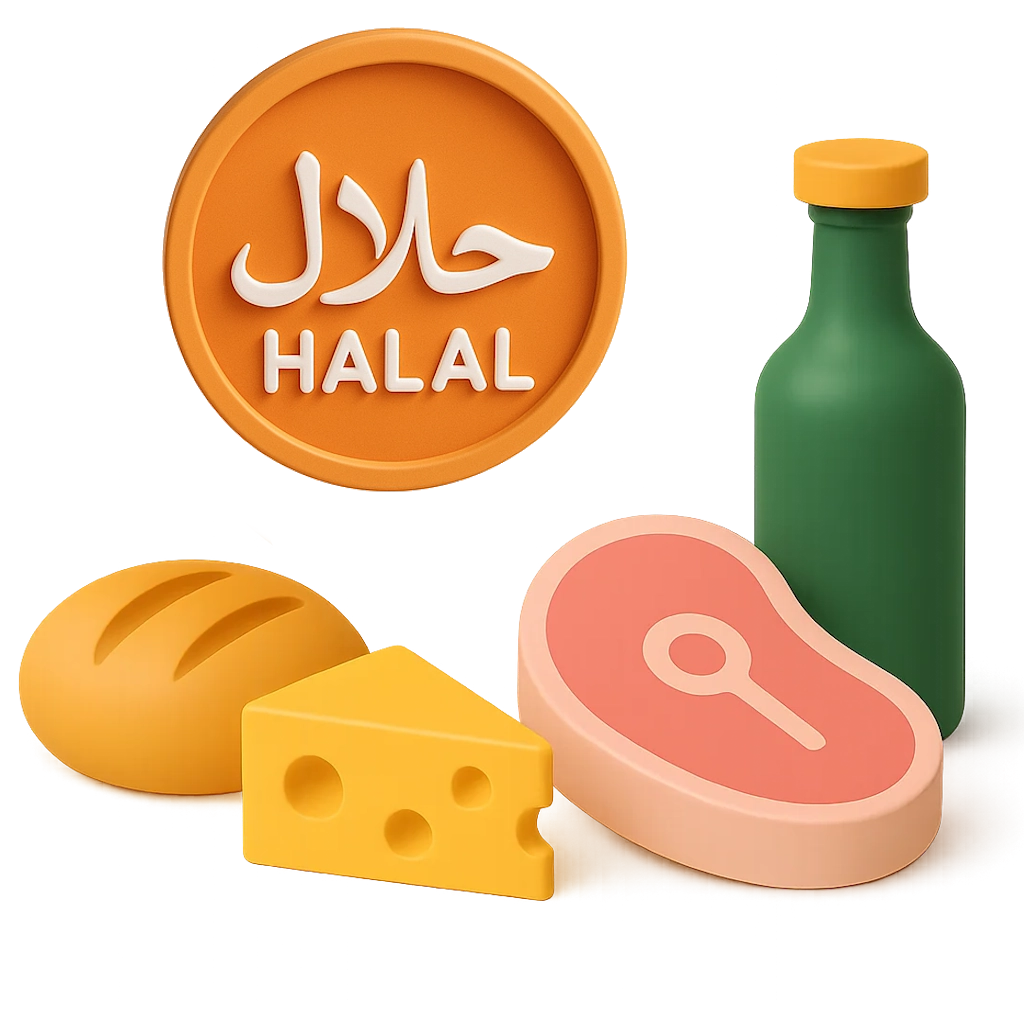Is it Halal?
Find out if your food is halal – fast and free
- Find Out in Seconds
- Eat with Confidence
- 100% Free
What is Halal?
The Arabic word "Halal" (حلال) literally translates to "permissible" or "lawful." It is a central concept in Islam, derived from the Holy Quran and the Sunnah (teachings and practices of Prophet Muhammad, peace be upon him). In contrast, "Haram" (حرام) means "forbidden" or "unlawful."
Between these two clear-cut categories lies "Mashbooh" (مشبوه), which refers to things that are doubtful or questionable; Muslims are generally advised to avoid Mashbooh items to err on the side of caution.
The Quran explicitly mentions certain foods as Halal and Haram. For instance, Surah Al-Ma'idah (5:3) outlines some prohibited items, while Surah Al-Baqarah (2:173) also provides guidance. The core principle is that all foods are Halal unless specifically designated as Haram. This principle of "permissibility by default" is a cornerstone of Islamic jurisprudence regarding food, making it easier for Muslims to navigate dietary choices unless a prohibition is clearly stated.
Ready to Check a Food?
Use our free tool to get an instant analysis of ingredients and Halal status.
Try It NowIdentifying Halal and Haram: Ingredients & Certification
Key Principles of Halal Food
Several key principles determine whether a food item is Halal, ensuring that consumption aligns with Islamic ethical and spiritual values: Source of Meat: Permissible (Halal) land animals include cattle, sheep, goats, camels, deer, and poultry like chicken, turkey, and duck. These animals must be herbivores.
Islamic Slaughter (Zabiha): For the meat of permissible animals to be Halal, the animal must be slaughtered in a specific manner known as Zabiha. This involves a swift, deep incision with a sharp knife to the throat, cutting the windpipe (trachea), gullet (esophagus), and the two jugular veins, while the name of Allah (God) is invoked (Tasmiyah).
Common Haram (Forbidden) Items
Beyond the general principles, it's helpful to be aware of some common food items and categories that are explicitly Haram: Pork and all its derivatives: This includes bacon, ham, sausages made with pork, lard, and ingredients like gelatin, glycerin, or emulsifiers if derived from pork.
Alcoholic beverages: Wine, beer, spirits, and any food products where alcohol is added and remains in the final product. Animals not slaughtered according to Islamic Zabiha rules, or those slaughtered by invoking a name other than Allah. This includes most conventionally slaughtered meat in non-Muslim countries unless specifically certified Halal.
Navigating Food Labels and Ingredients
Reading food labels carefully is a crucial skill for adhering to a Halal diet, especially in diverse food markets. Many ingredients can have ambiguous origins. E-Numbers: These are codes for food additives. Some E-numbers can be derived from animal sources (which may or may not be Halal) or involve alcohol in their processing.
Gelatin: Commonly found in sweets (gummies, marshmallows), desserts (jelly), yogurts, and pharmaceutical capsules. Gelatin is often derived from pork or non-Halal beef. Look for fish gelatin, plant-based gelling agents (agar-agar, carrageenan, pectin), or products explicitly stating "Halal gelatin" or "beef gelatin (Halal)."
The Importance of Halal Certification
Halal certification provides consumers with an added layer of assurance that a product has been thoroughly vetted by a recognized Islamic body and meets comprehensive Halal standards. These certification bodies typically inspect the entire supply chain, from raw ingredient sourcing and processing methods to packaging, labeling, and handling.
- What to Look For: Consumers should look for a reputable and recognized Halal certification logo on product packaging. Different organizations worldwide offer Halal certification, and their standards and recognition can vary.
- Benefits of Certification: It simplifies the decision-making process for consumers, builds trust between manufacturers and Muslim consumers, and facilitates international trade in Halal products. It also encourages food producers to adhere to higher standards of purity and hygiene.
- Limitations and Due Diligence: Not all Halal products are certified, especially those from smaller businesses or in local markets. In such cases, consumers need to exercise due diligence by carefully checking ingredients, understanding the source of animal products, and sometimes asking questions directly to the vendor or manufacturer. Certification is a tool, not the only means of ensuring Halal.
Beyond Food: The Scope of Halal
While this guide primarily focuses on food, it's important to note that the concept of Halal extends to many other aspects of a Muslim's life. This includes:
- Pharmaceuticals: Medications may contain gelatin (for capsules), alcohol, or other animal-derived ingredients. Halal-certified pharmaceuticals are becoming more common.
- Cosmetics and Personal Care: Many cosmetics and personal care products can contain animal-derived fats, alcohol, or other questionable ingredients. The demand for Halal cosmetics is growing.
- Finance and Business: Islamic finance operates on principles that forbid interest (Riba) and investments in Haram industries (e.g., alcohol, gambling, pork).
- Conduct and Ethics: Halal also pertains to lawful earnings, ethical conduct in business and personal interactions, and overall lifestyle choices that are in harmony with Islamic teachings.
Explore Our Blog
Read our latest articles for more insights on Halal food and lifestyle.
Visit the Blogisithalal.food: Your Partner in Confident Eating
Navigating the complexities of Halal food choices in today's diverse marketplace can be challenging and time-consuming. isithalal.food is designed to simplify this process for you. Our tool provides quick and accessible insights to help you determine if a product is likely Halal, Haram, or Mashbooh (Uncertain).
*Analyses are for informational purposes only and do not constitute professional advice. Use at your own risk. isithalal.food and its associates cannot be held liable for any decisions made based on this information.
